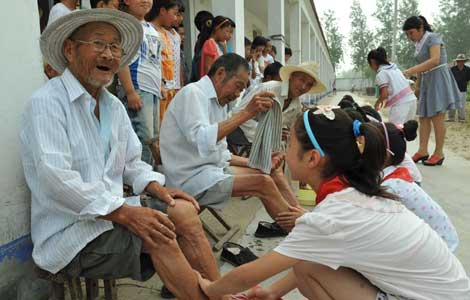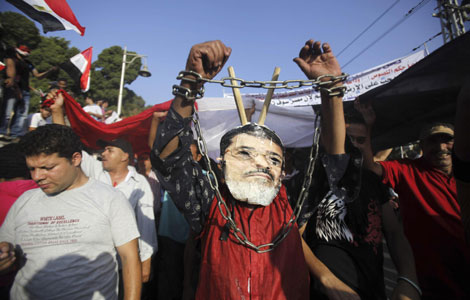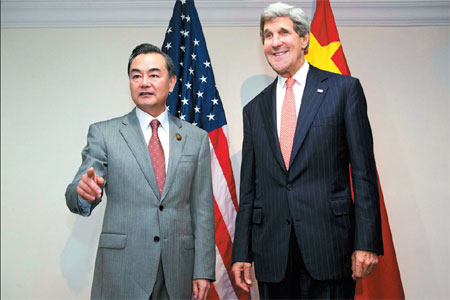Kerry hails China's denuclearization bid
Updated: 2013-07-02 11:31
By Chen Weihua in Washington (China Daily)
|
||||||||
|
US Secretary of State John Kerry meets with China's Foreign Minister Wang Yi at the ASEAN meeting in the International Conference Center in Bandar Seri Begawan, Brunei on Monday. Jacquelyn Martin / AP |
Despite an unpleasant episode over former US National Security Agency contractor Edward Snowden, China and the US have continued to show their growing convergence when it comes to a nuclear free Korean Peninsula.
US Secretary of State John Kerry praised on Monday China's efforts in pushing the Democratic People's Republic of Korea to abandon its nuclear weapons program.
"All of us - all four of us - are absolutely united and absolutely firm in our insistence that the future, with respect to North Korea, must include denuclearization," Kerry said in Brunei after meeting with Chinese Foreign Minister Wang Yi for bilateral talks, and with Japanese Foreign Minister Fumio Kishida and Republic of Korea Foreign Minister Yun Byung-se for a trilateral meeting.
"We have major, major issues with respect to North Korea, and China is cooperating with us with respect to that, and China has helped to make a difference," Kerry said ahead of the ASEAN (Association of Southeast Asian Nations) Region Forum, which opens in Brunei on Tuesday.
Kerry said the US and China will continue to discuss the denuclearization issue in the Strategic and Economic Dialogue to be held in Washington on July 10-11.
Also in Brunei, Chinese Foreign Minister Wang Yi called for an early resumption of the stalled Six-Party Talks after meeting his DPRK counterpart, Pak Ui-chun.
"I just want to let you know that as chair of the Six-Party Talks, we will continue to encourage peaceful sentiment for dialogue," Wang said.
Reiterating China's stance on the denuclearization of the Korean Peninsula, Wang said that he had noticed some positive changes there. He expressed the hope that all sides involved would work together towards the common goal and create conditions for bringing the Korean nuclear issue back on the track of dialogue.
While all members of the Six-Party Talks, which include China, the US, Russia, Japan, the DPRK and the ROK, are attending the ASEAN Regional Forum, US, Japanese and ROK officials have so far not taken advantage of the opportunity to meet with their DPRK counterparts, as they had previously. The US, which accused the DPRK of repeatedly backtracking on deals in the past, has insisted that any talks must involve action by the DPRK to show it is moving toward denuclearization.
The DPRK has indicated a willingness to hold talks in past weeks. It proposed high-level talks with the US two weeks ago on a peace treaty to formally end the Korean War. The suggestion came just a few days after the suspension of a planned meeting with the ROK due to disputes over protocol.
The denuclearization of the Korean Peninsula was a major topic of discussion between Chinese President Xi Jinping and his US counterpart Barack Obama in Sunnylands, California, early last month.
Richard Bush, director of the Center for Northeast Asian Policy Studies at the Brookings Institution, believes the DPRK is an area of convergence for the US and China on security issues.
"I think the US and China are moving towards the same wavelength on how to deal with provocations from Pyongyang," Bush said.
Scott Snyder, a senior fellow for Korean studies at the Council on Foreign Relations, believes China's clear statement on the denuclearization of the Korean Peninsula has bolstered the confidence of the Obama administration that the US and China might actually be able to cooperate in achieving a denuclearized peninsula.
"And it has become the major concrete hope for better US-China relations that is most directly associated with the idea that the United States and China can forge a 'new type of great power relationship', in which both powers can cooperate to achieve 'win-win' results," Snyder wrote on the Brookings website.
Tensions on the Korean Peninsula escalated after the DPRK conducted its third nuclear test on February 13. The exchanges of military postures and tough rhetoric in the following months between the DPRK, the ROK and the US have been followed by a flurry of diplomacy. Both John Kerry and Chairman of the Joint Chiefs of Staff General Martin Dempsey visited China in April to seek more support from China, while China sent Wu Dawei, its special envoy for Korean Peninsula affairs, to Washington.
In the past weeks, the DPRK also sent senior envoys, including top military figure Choe Ryong-hae and First Deputy Foreign Minister Kim Kye-gwan, to Beijing. Meanwhile, ROK President Park Geun-hye, who speaks Chinese and is popular among the Chinese public, paid a high-profile visit to China last week, her first visit to an Asian nation since taking office in February.
China has shown a noticeable shift in its policy this time by condemning the DPRK for the nuclear test and by endorsing sanctions at the UN Security Council. Several Chinese banks announced in May they were closing the accounts of the DPRK Trading Bank, which was believed to be involved in the country's nuclear program.
China has emphasized both the stability and denuclearization of the Korean Peninsula as essential in the solution. It has been unwilling to consider cutting food and fuel supplies to the DPRK as leverage out of what Chinese diplomats call humanitarian concerns.
Agencies contributed to this story.
chenweihua@chinadailyusa.com
(China Daily USA 07/02/2013 page1)

 Egypt army gives Mursi 48 hours to share power
Egypt army gives Mursi 48 hours to share power
 No quick end in sight for Beijing smog
No quick end in sight for Beijing smog
 New filial law sparks debate
New filial law sparks debate
 Bakelants claims Tour de France second stage
Bakelants claims Tour de France second stage
 2013 BET Awards in Los Angeles
2013 BET Awards in Los Angeles
 Gay pride parade around the world
Gay pride parade around the world
 Four dead in Egypt clashes, scores wounded
Four dead in Egypt clashes, scores wounded
 New NSA spying allegations rile European allies
New NSA spying allegations rile European allies
Most Viewed
Editor's Picks

|

|

|

|

|

|
Today's Top News
Kerry hails China's denuclearization bid
19 firefighters killed in Arizona fire
Book reveals islands' true history
Tokyo warned not to resort to 'empty talk'
Snowden applies for Russian asylum
No quick end in sight for Beijing smog
New home prices defy curbs
Mandela 'still critical but stable'
US Weekly

|

|







